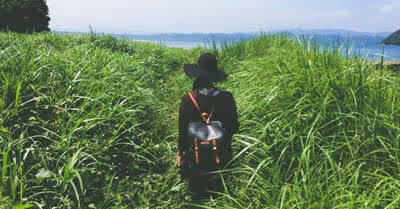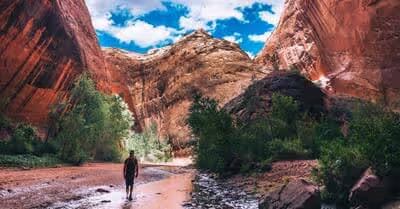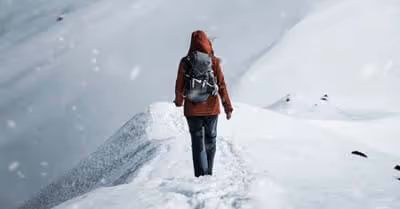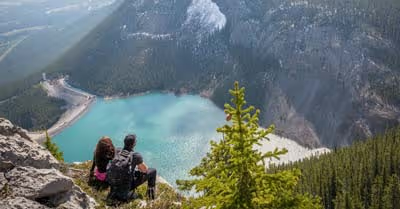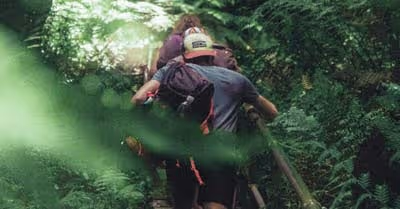Table of Contents
When do you NOT need hiking boots?
The only situations where you certainly don't need hiking boots are shorter low-intensity walks. If you are walking around town doing your shopping, you are fine with sneakers. If you are planning on going jogging through places you might otherwise wear walking boots, it is still better to wear running shoes. Hiking boots are not meant for running at all. They do not allow the range of motion needed for running.
When do you need hiking boots?
Hiking boots should be worn in any situation where you will be on rough, rocky, walking trails. This is when your feet are most at risk, be it from slipping or from loose debris. The trails are not maintained the same way that the sidewalk in your town will be. Hiking boots offer so many safety and comfort features that make them the number one choice for walking trails or through the countryside.
What are the advantages of wearing hiking boots?
There are so many advantages to wearing hiking boots. I will break them down into the three main factors that should be considered: comfort, safety, and support:
Comfort:
Hiking over long trails full of slippery hills, rough terrain, and muddy puddles are part of the fun! But, it isn't always fun for your feet. Although your feet are incredibly strong and have naturally evolved to be capable of making this walk barefoot if needed, they would rather have some help. Hiking boots offer more comfort over rougher terrain than, say, running shoes. Because they have padded soles and comfortable interiors. Running shoes do have padding, but it is designed for higher impact and protection against more friction. Runners need as little friction in their shoes as possible, or they will end up with feet cut to pieces and blisters all over. Hiking boots do not suffer from this same drawback, they can be more padded. They can be wooly inside to keep you warm, in the colder weather. Whereas running shoes are not. Part of the reason Hiking boots can be more comfortable than running shoes is that they are almost always designed to accommodate your foot, with thicker walking socks.
Expanding on the warmth aspect, running shoes opposed to walking boots are not well insulated. Walking through the cold weather, or worse, trudging directly through snow, can be terrible for your feet. The cold weather can not only be unpleasant for your feet, but it can also put you at risk of things such as hypothermia and complications stemming from that.
Lastly, waterproofing. Many hiking boots have been designed to keep as much water out as possible. as walking through snow, ice, streams, and creeks is a real possibility on your journeys. Keeping water out prevents hypothermia, prevents blisters from occurring, and prevents issues such as trench foot over long hikes. Running shoes are not as waterproof, many are designed to breathe as much as possible, to aid runners. A downside of this is that makes it even easier for water to get in.
Safety:
Safety on the trail is always the number one priority. Being aware of your surroundings, having a map and compass if necessary, and taking all the necessary precautions is only one side of it. You need to be wearing your safety gear. Just like when working on a job site, or in a factory, wearing the correct footwear to keep your feet safe is very important. No matter how much you prepare, if you arent wearing hiking boots you cant keep your feet safe. Rocky terrain offers plenty of opportunity for slipping and sliding. While this may not seem like a big issue for you at first, it as highly dangerous. Whether it is you doing the slipping and sliding, or rocks and debris, you'll be grateful for the extra protection hiking boots offer. Running shoes, with flexibility in mind, do not have the rigidness to withstand this. Rocks and other debris sliding into your feet can cause bruising and abrasions, or worse broken bones.
If it is you that you may find sliding, not debris, your hiking boots with better grip will come in handy. Running shoes are meant to grip asphalt road or maybe grass, not gravel and stones. If you look at the difference underneath a running shoe and a hiking shoe it is night and day. The hiking shoe grip will be very rigid and very deep, with lots of grooves all over the shoe to maximize its grip on the trail. Running shoe grip will be shallower, more springy and cover less of the shoe. Running shoes will not help you grip the gravelly trail or a slippy rockface you may need to scramble over.
Support:
Running shoes, as opposed to hiking boots, offer support on flat surfaces. They are designed to support your feet running over roads, not so much rocky terrain. They are flexible to give your feet lots of movement to make the running motion as comfortable as possible. Which is great! Unless you don't want your ankles to be able to move that much. When hiking over rough terrain and scrambling up rocks, your ankles and your feet need to move as little as possible. This prevents strains and sprains from occurring. It is similar to how basketball players wear very high topped shoes when they play. Runners need that full range of motion for springiness and speed. Hikers don't need these things, as they will be taking things much more slow and steady.
Are there any disadvantages to wearing hiking boots?
Sure, there are some downsides to wearing hiking boots. They are not the best choice for every situation, and they do have some very real drawbacks that might make them a deal-breaker for you. Here are the biggest issues you may find:
Cost:
The cost of buying good quality hiking boots is far more than a cheap pair of running shoes. Sure, you get what you pay for, but if you are only looking for something to wear as you casually walk across the countryside for a couple of hours every fortnight, maybe they aren't for you. This links back to only needing walking boots if the terrain demands it. You probably shouldn't waste your money on shoes that you only wear a few times a year.
Maintenance:
Walking shoes require time to break in, and time and care to keep them up to scratch. They need this time and attention to make sure they stay comfortably fitting and in good condition. Or else they may lose their rigidity and waterproofing. Because walking boots are designed to keep water and other things out, they keep smells and bacteria in. They must be cleaned often or they will degrade, you also run the risk of getting problems such as athletes foot.
Weight:
Walking shoes are much heavier than running shoes, they need to be if they are to serve their purpose. But it does have some drawbacks. The extra weight can cause your feet to ache over prolonged periods. It is not just your feet either, adding extra weight to your feet increases the difficulty on your back. Your feet don't have muscles dedicated to lifting heavy weights, why would they? So instead your back has to carry the extra weight. This can lead to you becoming more tired over long walks than you might otherwise be if you had worn light running shoes.
Blisters:
You may not get blisters for the same reason you would running, from intense friction, but they are still a risk. Hiking boots don't just trap in the smell with their intentional waterproofing, they trap in your sweat. Ignoring how unpleasant that sounds, it can lead to painful complications too. Your pooled sweat in the soles of your shoes will soften your skin and cause it to prune as if you had been swimming. Once your skin is softened like this, any friction is much more likely to rub away the skin causing a huge increase in blisters and general soreness. Because running shoes are more permeable and will allow the sweat to leave the shoe (or just cause you to sweat less in general as they can breathe better) you are unlikely to get blisters. Runners get blisters from the increased friction if you are wearing running shoes for hiking, that's not going to be as much of a problem.
Conclusion
To summarize, do you need hiking boots? It fully depends on your needs. If you are looking for a good quality pair of shoes that you will be able to hike, scramble over rocks, and ford streams with. Yes, you probably should get some hiking boots. If you are only going to be walking through the woods, on relatively flat trails, are hiking boots necessary? No, probably not. Only you can decide what boots suit your needs, hopefully, this article has provided you with all the information that you feel you need to make an informed decision.
Recent Articles



